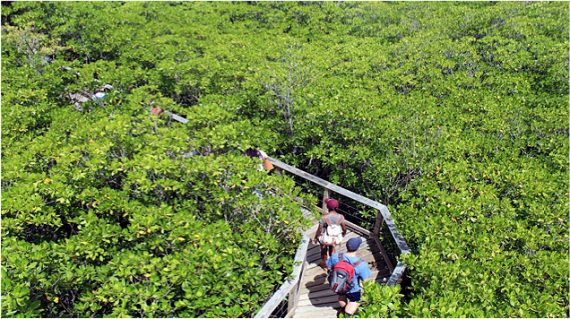
Students tour mangrove forests in Puerto Rico.
In support of Colgate’s strategic plan, the Max A. Shacknai COVE announced the availability of a new course development grants that promote civic education in the curriculum. These grants aim to provide faculty with the resources to offer students immediate opportunities to apply classroom learning to support or enhance the work of social change agencies.
April Baptiste, Associate Professor of Environmental Studies, was awarded the course development grant this year to support her Caribbean Ecology course. She writes of the course:
When I decided to add a service component to my Caribbean Ecology and Environmental Concerns class, I envisioned using the physical environment to have students work alongside a community organization to achieve a particular goal that is set by the community partner. This decision was easy for me as I believe that service is one form of justice and wanted to provide the opportunity for students to think about justice in a different way – i.e. outside of the traditional judicial sense.
This course has a number of learning- and community-based outcomes that I hoped were achieved at the end of the semester and the service experience.
- Course objectives: The course sought to answer the following questions
- What are the different ecological settings of the Caribbean islands ranging from the terrestrial to the marine?
- What are the human-environment interactions within these ecological contexts?
- How have these interactions led to stressors within the ecological settings?
- What are the implications of these stressors?
- Learning outcomes of the service experience
- To expose students to the complex physical and social processes involved in the human-environment interaction within Caribbean nations
- To train students to develop educational and outreach materials that will have a positive impact on real-world communities
- To encourage students to become effective student teachers by communicating complex ideas to a nonexpert audience through the dissemination of information via videos. This outcome was particularly important given the language barrier that existed for some students. Given that the primary language is Spanish in Puerto Rico, our students who are not knowledgeable of Spanish (though working with translators) had to learn nonverbal skills in communicating with community partners.
- Community partner outcome
- To expand the education and outreach materials for fishing communities currently neglected in the political and social system
Visiting both sides of the country and working on two different projects provided us with the opportunity not only to learn different skills and work with different kinds of community partners including a university and an NGO, but it also allowed us to visit physical spaces to link some of our in-class discussion materials to what is in the real world. Specifically, we were able to visit the tropical rain forest and mangrove forests. We had the opportunity to snorkel in both fringing reefs (shallow waters) and also some deep water patch reefs. We had the opportunity to explore different kinds of coastal beach systems and saw wave action both constructive and destructive. Finally, we were able to visit a river understanding the freshwater ecosystems that we learnt in class. All of these allowed the theory to be lived – an opportunity that would not have been ordinarily afforded to students.
The students had a memorable experience as can be seen from the following quotes from some of the participants:
“This service trip has allowed me to solidify my interest in environmental studies and form awesome new friendships with awesome people; all while serving and learning from great communities in Puerto Rico!” – Marisa Olavarria ’19
“I learned that passion is powerful. Meeting and interacting with people who truly care about the work they do and the condition of the island was amazing and moving. Seeing people who are doing their job for the job itself and not using the position as some stepping stone has been inspiring.” – Max Michael ’19
“I learnt so much during this service trip. I learnt so much about myself, the many different ecological spaces of Puerto Rico, and the other students I traveled with…” – Tyler Maxie ’18
“During this trip I learned that our service was most effective when it is planned by local individuals who work side-by-side with us…” – Siena Frost ’19
“One of the main things… is the idea of being partners, instead of parents …the volunteer must comply with the host’s values, use his knowledge to the best of his ability, and most importantly, be emotionally self-aware and empathetic to thrive in a collaborative environment…” – Fjordi Mulla ’19
Service learning is engaging in a form of justice. We who are privileged are able to get the opportunity to visit, learn from, and help those that may not be as privileged and who may need volunteers to advance their agendas. We learnt to be humble and to actively listen to the needs of our community partners. The experience was well worth it and it is something that if afforded the opportunity, would contribute immensely to enriching the lives of our students at Colgate.

